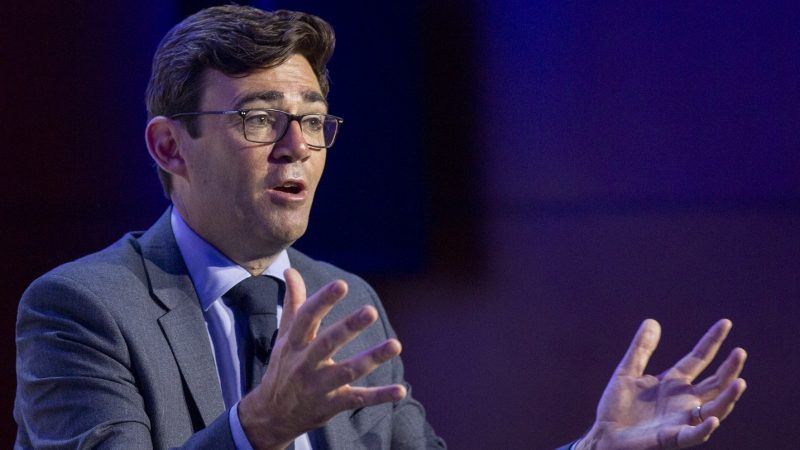Andy Burnham says it is time for ministers to stop evading questions around Brexit.

Three Labour mayors from northern regions are calling for urgent action to help the music industry recover from post-Brexit destruction.
Among them is Manchester mayor Andy Burnham, who criticised the ‘ridiculous’ rules involving UK artists touring in Europe post-Brexit, and has called for the ‘free exchange’ of musicians throughout the continent.
Burnham was part of a panel of speakers at the inaugural Beyond the Music festival, which took place in Manchester on October 11 – 14. Artists, creatives, and music industry professionals, connected with businesses, funders, and organisations to discuss how to make the music industry better than ever.
Noting the impact Brexit has had on the industry, the mayor said there needs to be a campaign to show how ‘critical’ the situation has become for both artists and venues. Burnham spoke alongside West Yorkshire mayor, Tracy Brabin and Steve Rotherham, mayor of Liverpool City Region. The regional mayors said they need to work together to create a system which enables musicians to travel freely across Europe.
“I think as mayors we need to build this campaign really strongly from the bottom up to say this industry is critical to us, not marginal, critical, and we need an arrangement that allows for [the] free exchange of musicians touring here from Europe and for British musicians going [into Europe],” said Burnham.
He continued that such a free exchange is not just ‘absolutely critical’ to Britain’s ‘visitor economy,’ but also for the way UK cities are perceived and known in Europe.
“It’s just a nonsense, isn’t it? You’re having to learn about ETIAS [visas to work in Europe] and all of this. It’s going to damage us far more than we probably know as a country if we allow this stuff to stay in place,” said Burnham.
Steve Rotherham spoke of the same concerns, informing the festival how this year’s hosting of Eurovision in Liverpool had been affected by Brexit rules, including some artists being refused entry. He said that ‘blind eyes were turned’ because ‘the eyes of the world were on us.’ Rotherham continued that there were ‘ways around some of the nonsense,’ proving that such issues could be overcome with more collective thinking.
“It all just needs clarification, doesn’t it? We need to really pick out the issues and then get somebody one by one to say, ‘okay, that’s how you fix that. That’s how you sort that one off,” said the mayor.
He also alluded to Boris Johnson’s rejection of a visa-free touring plan for musicians and their crew in the EU. In failing to secure visa-free travel for artists wanting to tour in Europe, Johnson added significant costs to live music tours in Europe.
Tracy Brabin referred to the difficulties musicians in her region have experienced in selling merchandise in Europe, due to complex post-Brexit VAT rules, including how artists now incur charges when trying to sell merchandise in the EU.
“A lot of young people are telling me part of the problem is merchandise and they can’t take their t-shirts and all their stuff [to sell] in because it costs too much money – but that’s the only way they’re making money in the first place,” she said.
The Beyond the Music conference followed a report that showed around 50 percent of UK musicians work for less money since Brexit. The report also found that 40 percent of musicians have had work cancelled since January 1, 2021, with almost the same number being forced to turn down planned work. The Paying The Price report was compiled by the UK’s professional body for musicians, the Independent Society of Musicians (ISM) and was published in August. Deborah Annetts of the ISM said the government has been “asleep on the job.”
“It could have tackled many of the issues facing the music sector by itself and made Brexit work. It chose not to,” said Annetts.
Andy Burnham said it was time for ministers to stop evading questions around Brexit.
“I think the mayors can really be a voice for the industry…let’s really move beyond this sort of period that we’ve been in, this political sort of dead zone post-Brexit. Let’s start calling out clearly what really is not working here in the interest of the country and start reaching out to [our] colleagues in Europe to get it fixed,” he told the festival.
Gabrielle Pickard-Whitehead is a contributing editor to Left Foot Forward
Image credit: Flickr – World Economic Forum
To reach hundreds of thousands of new readers we need to grow our donor base substantially.
That's why in 2024, we are seeking to generate 150 additional regular donors to support Left Foot Forward's work.
We still need another 117 people to donate to hit the target. You can help. Donate today.



